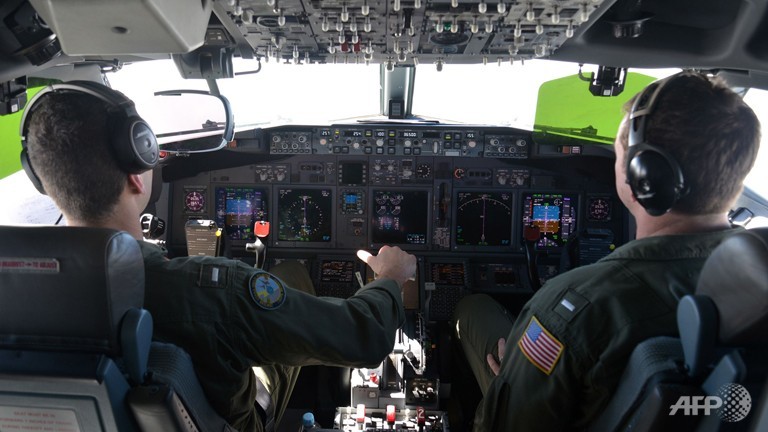US Navy deploys black box locator after Malaysia plane leads

US naval aviators piloting a P-8A Poseidon plane over the Indian Ocean during a mission to assist in search and rescue operations for Malaysia Airlines flight MH370, part of the assistance by the US 7th Fleet. (AFP/US Navy photo by Mass Communication Specialist 2nd Class Eric A Pastor/Released)
>> Chinese MH370 search plane finds "suspicious objects": Xinhua
>> Australia "clutching" at MH370 leads after new data
TOKYO: The US Navy said Monday it was sending a black box locator to an area of the southern Indian Ocean being scoured for the missing Malaysian jet, following a cluster of weekend debris sightings.
The navy called the move a "precautionary measure" in case those sightings confirm the location of the aircraft which disappeared on March 8 with 239 people on board.
"If a debris field is confirmed, The Navy's Towed Pinger Locator 25 will add a significant advantage in locating the missing Malaysian aircraft's black box," Commander William Marks, a spokesman for the US Seventh Fleet, said in an e-mailed statement.
The locator system relies on acoustic signals to help find flight recorders -- also known as black boxes -- on downed navy and commercial aircraft to a maximum depth of 20,000 feet (6,000 metres), he added.
However, the statement cautioned that the deployment did not mean the missing jet's location had been confirmed.
"Please note that movement of the Towed Pinger Locator into the region is not an indication that we have confirmed a debris field," it said.
"It's a precautionary measure so that if we do find debris, we'll be ready to deploy the equipment to listen for the black box."
On Monday, a Chinese military plane set off from the western Australian city of Perth at first light to search for "suspicious debris" floating in the remote waters and captured by Chinese and Australian satellite imagery, China's state news agency Xinhua said.
The sighting of a wooden pallet and other debris that may be linked to the Malaysian passenger jet gave the sense Sunday that the hunt was finally on the right track after more than two weeks of false leads and dead ends.
It was reinforced by new French satellite data indicating floating objects in the southern search area.
Australian officials said the pallet, along with belts or straps, was spotted Saturday in a remote stretch of the Indian Ocean that has become the focus of the search -- around 2,500 kilometres (1,500 miles) southwest of Perth.
What the stars mean:
★ Poor ★ ★ Promising ★★★ Good ★★★★ Very good ★★★★★ Exceptional
Latest News
More News
- Russian President congratulates Vietnamese Party leader during phone talks (January 25, 2026 | 09:58)
- Worldwide congratulations underscore confidence in Vietnam’s 14th Party Congress (January 23, 2026 | 09:02)
- Political parties, organisations, int’l friends send congratulations to 14th National Party Congress (January 22, 2026 | 09:33)
- 14th National Party Congress: Japanese media highlight Vietnam’s growth targets (January 21, 2026 | 09:46)
- 14th National Party Congress: Driving force for Vietnam to continue renewal, innovation, breakthroughs (January 21, 2026 | 09:42)
- Vietnam remains spiritual support for progressive forces: Colombian party leader (January 21, 2026 | 08:00)
- Int'l media provides large coverage of 14th National Party Congress's first working day (January 20, 2026 | 09:09)
- Vietnamese firms win top honours at ASEAN Digital Awards (January 16, 2026 | 16:45)
- ASEAN Digital Ministers' Meeting opens in Hanoi (January 15, 2026 | 15:33)
- ASEAN economies move up the global chip value chain (December 09, 2025 | 13:32)
















 Mobile Version
Mobile Version